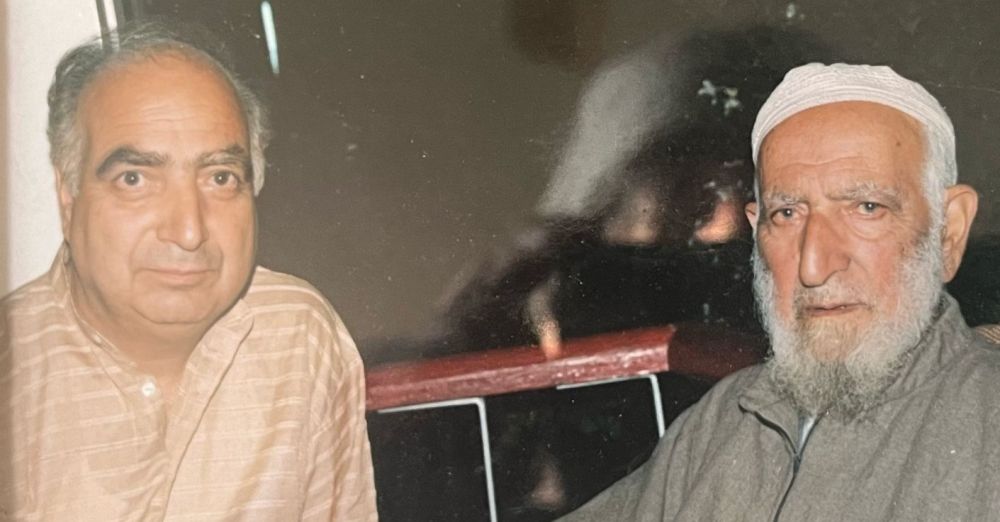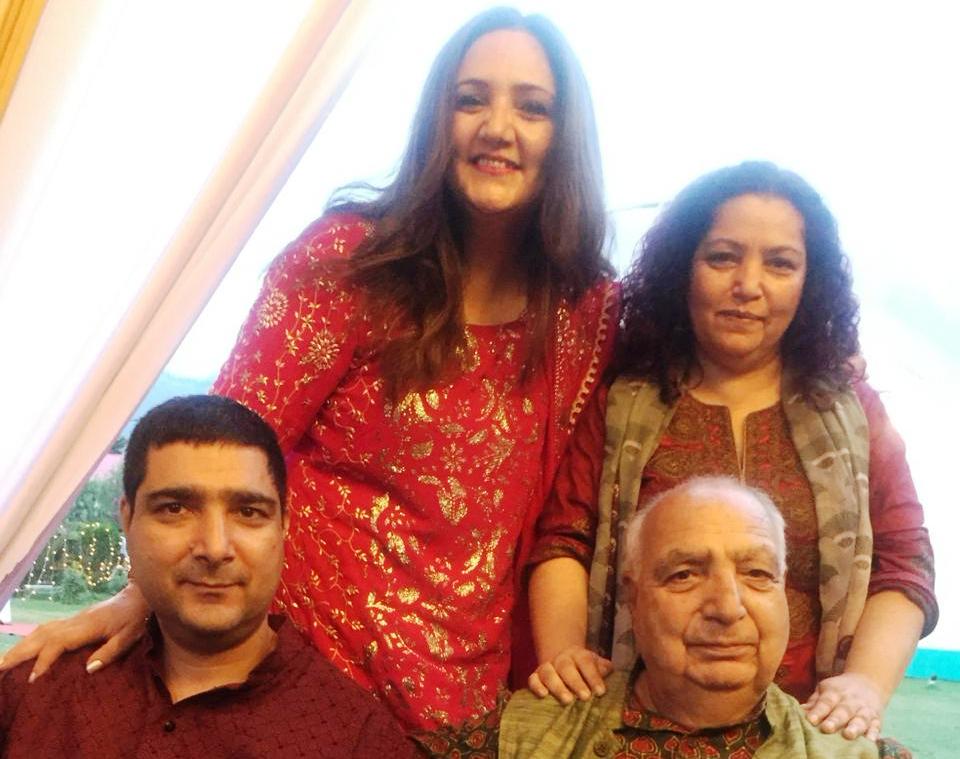After struggling with many ailments, Kashmir’s premier broadcaster, Farooq Nazki died days ahead of his 84th birthday. With his career spanning journalism, broadcasting, and literature, his influence in Kashmir was far-reaching and enduring, writes Babra Wani
Rabiya Nazki took to Facebook to share a poignant moment with her father, accompanied by a photo of him and family members in the hospital. In a faint voice, her father expressed, “mujhe marne se dar nai lagta, par jo mujh pa merte hain unka kya hoga” (I am not afraid to die, but what will happen to those who depend on me). Alongside the image, Nazki referred to her father as a Miracle Man and expressed her love for him.
Days after the post, on February 6, Farooq Nazki, 83, succumbed to his battle with chronic health issues. He breathed his last at a hospital in Katra where his son is a medical doctor. Both his daughters, Raohi and Rabia, and his wife were with him.
Farooq Nazki, a distinguished poet, and broadcaster renowned for his work in Urdu and Kashmiri languages, left a void in Kashmir’s literary community. His demise follows the loss of other stalwarts like Ghulam Nabi Khayaal and Rehman Rahi, all prominent figures in Kashmiri literature.
Recipient of the Sahitya Akademi award, Nazki was celebrated for his wit and generosity among his peers. His father and uncle have also got the same honour for their literary work.
Life Story
Farooq Nazki, whose parents hailed from the Madder area of Bandipora, was born on February 14, 1940, into a family with a scholarly background; both his father and uncle were Sahitya Akademi award winners. Beginning his literary journey as a poet in 1967, Nazki’s younger brother, Ayaz Nazki, remarked, “His inclination towards poetry and literature may have been influenced by his familial surroundings.”

In 1960, Nazki briefly ventured into journalism with the local newspaper Zamindar, focusing primarily on issues affecting the labour class. He later joined All India Radio as an announcer and newsreader. Nazki also had the opportunity to travel to foreign countries such as Germany and the UK, where he received training in television and programming, establishing himself as one of the pioneering Indian broadcasters to travel to Europe.
During his tenure at Radio, Nazki contributed to the enduringly popular radio drama Zoon Daeb by Pushkar Bhan, portraying the character Ramba in the morning family drama which ran for nineteen years.
One of the popular broadcasts, Zoon Daeb was started in the wake of the 1965 India-Pakistan war and was an instant hit. Its characters were Somnath Sadu (Agh Sahib), Maryam Begum (Agh Bai), and Ghulam Nabi Baba. Somewhere in February 1967, Pushkar Ban was introduced as Ma’am Pip Ji, a new character and in January 1967 Bashir Arif was introduced as Nazir Lala, a child. In 1971, Pushkar Ban took off for some training in Australia paving the way for Nazki’s entry into the broadcast as Ramb Lala besides also Ashok Kak as Ismail. The writers who provided the script included Somnath Sadu, Pushkar Ban, Farooq Nazki, Bashir Arif, and much later, Ali Mohammad Lone Akhtar Mohiuddin.
Following the assassination of his boss Lassa Koul in 1990, Nazki assumed his role and became the head of Doordarshan. This responsibility came to him at a time when working for DD was no less than operating in a garrison. One of the highest protected persons in Kashmir, Nazki was moving in a huge cavalcade and had round a clock guard. The assignment gave him access to the very interior of the governance structure with him having a direct line to Delhi and Raj Bhawan. Additionally, he served as the Director of All India Radio’s Srinagar station.
In the formative years of DD Kashmir, Nazki played a pivotal role, contributing to the creation, production, direction, and writing of numerous dramas and programmes like Totme and Beghum Salal over nearly three decades.
“He was a trendsetter,” remarked Shabir Mujahid, also a former Doordarshan Director and writer. “Back then, there was no concept of soap operas, but he produced a sitcom comprising almost 300 episodes called Shabrang. He also created other series, including a comic series named Sodhe te Bodhe.”
During the 1970s, Nazki initiated news and current affairs programmes and discussions, featuring prominent hosts. He introduced a live chat show titled Ghulam, Beghum, Baadshah.
Mujahid acknowledged Nazki’s role in fostering talent at DD Kashir, mentioning figures like Bashir Dada, Ayash Aarif, and Makhan Lal. Comparing him to Raj Kapoor in terms of showmanship, Mujahid noted Nazki’s adeptness in technology.
Nazki held various roles including director and assistant director, overseeing multiple stations including Radio Kashmir Jammu. He retired as Deputy Director General in 1998 from the Central Production Centre, New Delhi.
Following retirement, Nazki served as a senior consultant with Take One, a privately owned cable channel in Jammu.
Nazki also served as Press Secretary and Media Advisor to Chief Minister Farooq Abdullah on two occasions, later becoming a Media Consultant to Omar Abdullah.
“Whenever one met him, he was always very humble, very generous and met you with warmth,” a senior journalist from Kashmir remarked. “As a human being, he was very kind. I know him as a very kind human being.”
Ayaz Nazki echoed these sentiments, describing him as a “lovely man who was born on Valentine’s Day. Everybody who knows him, remembers him as a man of people. He was very wonderful.”
Haseeb Drabu, his son-in-law was very close to him and they would often discuss the issues of knowledge. Nazki, Drabu said belonged to a generation that was torn between the old order they belonged to and the new order they intended to embrace. He said Nazki was unique in his comfort navigating diverse situations. “He could participate in a Khatam-e-Shrief, a discussion on Trika tradition, a seminar on monotheism and an engaging conversation on current affairs over coffee on the same day,” Drabu said. “And then one would trace him spending nights in drowning sorrows.”
Literary Work
Literary figure Farooq Nazki’s journey into the world of letters began during his schooling at SP College, where he remained deeply entrenched in the literary sphere throughout his university days, actively participating in literary gatherings.
Following in the footsteps of Mahjoor, Nazki emerged as a pioneer in translating Urdu Ghazals into Kashmiri, notably rendering Hasrat Mohani’s renowned ghazal chupke chupke raat din into the Kashmiri Vernacular – Yaad Chham Khaswin Jawani Taza Yawun Yaad Chum.

“His contributions warranted national recognition,” Mujahid said. “His poetry and writings exuded beauty.” Even after retirement, Nazki continued to foster literary discourse by organising gatherings and maintaining an impressive repertoire of published works.
Notably, Nazki hailed from a lineage steeped in literary tradition. His father, the late Ghulam Rasool Nazki, who also served the Radio Kashmir Srinagar, received the Sahitya Akademi award in 1987 for his poetic collection Awaz-e-Dost. In 1995, Farooq Nazki’s Kashmiri poetic collection Naar Hyutyn Kazalwanas (The Forests of Soot are on Fire). It was in 1999, when his uncle Rashid Nazki (September 18, 1931 –January 6, 2016) got the same award for his poetic collection Vahraat. Rashid had lost two of his sons and wife in a blast triggered by a grenade lobbed into his home in 1992.
“Kashmiri is our mother tongue, but Urdu also holds a special place as our second mother tongue,” Farooq Nazki said in a DD Talk Show Kad Aawar (The Tallest Figures) aired on DD Kashmir, that was re-aired after his demise. “Our Urdu, distinct yet deeply rooted, ensures the perpetuity of the Kashmiri language. Urdu, with its expansive reach, embodies a cultural legacy that holds personal significance for me.”
During the programme, Nazki emphasised the importance of both Kashmiri and Urdu languages to the people of Kashmir. In addition to his Kashmiri works, Nazki has authored poetic collections in Urdu such as Lafz Lafz Nowha and Aakhri Khwab Se Pehle. His literary contributions were acknowledged with a state Cultural Academy award for Lafz Lafz Nowha, alongside Naar Hyutyn Kazalwanas. Among his notable works are Kanzalwanus Naar Heutun, Kashmiri Dastkariyan, Mahjabeen, and Sat Baran. Nazki’s writing was renowned for its thought-provoking nature, often delving into themes that stirred human emotions.
Zareef Ahmed Zareef, a prominent Kashmiri raconteur, said Nazki’s writing exhibited a multidimensional perspective, reflecting his experiences in Kashmir and the evolving landscape. “His works eloquently captured various facets of life and the changing dynamics of Kashmir,” he said.
Zareef also lamented the significant loss brought about by Nazki’s passing, highlighting his substantial contributions to various aspects of society. “His demise, along with other prominent figures like Rahman Rahi, Ghulam Nabi Khayal, and Sultan ul Haque Shaheedi, marks a profound loss to our literary community,” Zareef said. “They were among the leading figures in our literary world, and their absence created a significant void.”
“We have learned from them, and now after losing these names, we are left leaderless. His poems are rich, and a writer is always an asset for a nation,” he stated. With Nazki’s passing, an era ends for writers and poets who have been stalwarts of literature for decades. “But the caravan will not stop; it will keep moving. However, we are now left with no Ustaads,” he added. Recalling his relationship with Nazki, Zareef remarked, “He used to read my words, then gave his feedback, his critiques. He was a dear friend of mine. I shared a close relationship with both him and his father as well. May Allah bless his soul.”
“Chalo ek bhaar phir say ahad kar lain muskuraanae ka,
Na tum halaat ki bemehrion ka tazkira karna,
Na mae posheeda zakhmoun ko zamaane par Ayaan kar luun…”
The best two-liners on his demise came from Drabu. “The passing away of a qalandar is not to be mourned; his fulfilling life is to be celebrated,” Drabu wrote while flying from London to join the mourning back home. “For he has left this station after enriching it in many ways. A societal loss is a personal bereavement. RIP Mir Mohammed Farooq Nazki (1940 – 2024).”















